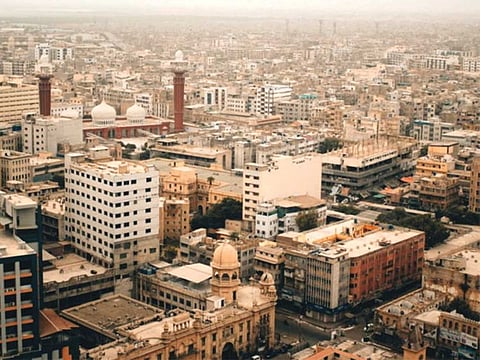Laying the course for Pakistan’s future
Transformation project will remain in trouble unless backed by changes on political front

Pakistan’s upcoming budget on June 11 marks a historic milestone in the country’s ability to turn the proverbial corner.
The new budget has been preceded by Prime Minister Imran Khan’s government promising the International Monetary Fund (IMF) to enforce a raft of economic changes that will together reportedly raise up Rs700 billion (Dh17.1 billion or roughly $4.6 billion) over the next 12 months. It’s the price for a $6 billion loan from the IMF that Pakistan has negotiated to lay the ground for stabilising its widely challenged economy.
Given that such a massive exercise involving expenditure cuts and tax increases has never been undertaken in Pakistan’s history, the impact could not only seal the fate of Imran’s regime in the months to come but more importantly lay the course for Pakistan’s future.
Pakistan indeed faces a crisis surrounding its economic trajectory. And yet, a closer analysis of the country’s broad contours will demonstrate that the crisis has equally to do with the direction of the state, the weakening of key institutions and the way Pakistan is run. In other words, the economic crisis is more about the overall management of Pakistan than just the economy per se.
It would be vital to ensure that the policies do not fail. This is central to Pakistan’s future given that the country has all too often framed world class policies, only to witness a failure of key frameworks being successfully put in place.Farhan Bokhari
Across Pakistan, there are many symptoms of the malaise that has challenged the country over the years. An ever widening difference between the haves and have-nots has created tracts of neglect surrounded by islands of relative prosperity as the vast amount of affluence has become shared by the relatively few. For instance the well-stocked markets for high-income Pakistanis have routinely witnessed ever growing turnovers, thanks to the blind expansion of Pakistan’s import bill irrespective of the country’s failing ability to afford such largesse.
Across major cities, notably Karachi, Lahore and Islamabad, the streets have witnessed the arrival of classy brands of automobiles in recent years while the Pakistani state has increasingly failed to cater to the needs of the poor.
A glance through last year’s economic survey published by the former government of the Pakistan Muslim League-Nawaz or PML-N clearly shows how the country’s exports crashed under the previous regime. Going forward, fixing the malaise will not only require an agenda driven by policies to reverse the slide. More importantly, it would be vital to ensure that the policies do not fail. This is central to Pakistan’s future given that the country has all too often framed world class policies, only to witness a failure of key frameworks being successfully put in place.
Recurring acrimony
For instance, a once powerful and independent national planning commission in Islamabad has been degraded over time. The world class experts who once functioned in this august institution have been sidelined to join the vast majority of civil servants with little independence and/or motivation to become agents of impressive change. To add to this aggravation, first came a politicisation of Pakistan’s once well-functioning bureaucracy followed by an ill-advised devolution plan under former president General Pervez Musharraf.
An ill-advised initiative to make civil servants subservient to elected representatives at the district levels across Pakistan has ended in disaster. As civil servants across the grass roots lost their ability to function independently, the system of elected representatives also failed to take off. Consequently, Pakistan was left with the worst of both worlds. Unless the country’s system of governance is fixed to re-establish the writ of the state, Pakistan’s ability to translate its policies into real life reality will remain in question.
At the same time, re-clocking Pakistan’s future journey will remain in trouble unless backed by fundamental changes on the political front. Recurring acrimony in politics beyond noisy exchanges in parliament is bound to keep the country unsettled. In a democratic environment, dissent by opposition politicians is central to the way a country is governed and Pakistan is no exception. Yet, notwithstanding the noise, the conduct of politics must not deter the policy direction especially for the long haul. In the past year since Imran became the prime minister, dissent in Pakistani politics has been fuelled by what appears to be a haphazard conduct of cases of corruption targeting opposition leaders.
Also Read: Time to push through reforms in Pakistan
Also Read: Pakistan-China ties are on a firmer footing
On the one hand, the popular perception has increasingly become that of opposition leaders being targeted under an official vendetta, given that the prosecution appears to be potentially open ended without a clear conclusion in sight. Consequently, it’s not surprising that Pakistan’s opposition parties have announced an antigovernment campaign in the coming weeks.
On the other hand, the absence of the top opposition leadership without a clear line of non-controversial successors in sight also carries its own risk. In the coming months, a public backlash may well be witnessed across Pakistan in response to a series of belt tightening measures. It would be essential for the government to ensure a number of measures in areas like controlling prices of commodities of daily use, to ensure that the existing cartels in different sectors do not push for excessively unreasonable returns.
But it would also be vital for the opposition to be allowed to play its due role. Locking up opposition politicians across the board to curb dissent will likely be counter productive. At the very worst, public protests without a leader to represent their outrage risks creating a rudderless mob rather than a movement for change. And as witnessed elsewhere in the world, mobs without leaders carry unpredictable consequences especially for an otherwise difficult country to govern.


